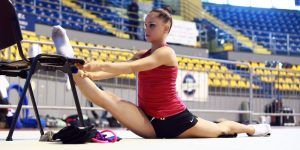What Is Sports Psychology? 9 Scientific Theories & Examples
 Heading out the door at 5 a.m. for another long, cold training run in the dark takes single-minded motivation.
Heading out the door at 5 a.m. for another long, cold training run in the dark takes single-minded motivation.
And maintaining focus when your team is behind and heading into the final few minutes of the game requires mental toughness.
Sports are played by the body and won in the mind, says sports psychologist Aidan Moran (2012).
To provide an athlete with the mental support they need, a sports psychologist considers the individual’s feelings, thoughts, perceived obstacles, and behavior in training, competition, and their lives beyond.
This article introduces some of the key concepts, research, and theory behind sports psychology and its ability to optimize performance.
Before you continue, we thought you might like to download our three Goal Achievement Exercises for free. These detailed, science-based exercises will help you or your clients create actionable goals and master techniques to create lasting behavior change.
This Article Contains:
What Is Sports Psychology?
“Sport psychology is about understanding the performance, mental processes, and wellbeing of people in sporting settings, taking into account psychological theory and methods.”
Meijen, 2019
Sports psychology is now widely accepted as offering a crucial edge over competitors. And while essential for continuing high performance in elite athletes, it also provides insights into optimizing functioning in areas of our lives beyond sports.
As a result, psychological processes and mental wellbeing have become increasingly recognized as vital to consistently high degrees of sporting performance for athletes at all levels where the individual is serious about pushing their limits.
Indeed, as cognitive scientist Massimiliano Cappuccio (2018) writes, “physical training and exercise are not sufficient to excel in competition.” Instead, key elements of the athlete’s mental preparation must be “perfectly tuned for the challenge.”
For example, in recent research attempting to understand endurance limits, psychological variables have been confirmed as the deciding factor in ceasing effort rather than muscular fatigue (Meijen, 2019). The brain literally limits the body.
Beyond endurance, mental processes are equally crucial in other aspects of sporting success, such as maintaining focus, overcoming injury, dealing with failure, and handling success.
As psychologists, we can help competitors enhance their performance by “providing advice on how to be their best when it matters most” (Moran, 2012).
4 Real-Life Examples

Pushing from within
As long ago as 2008, Tiger Woods confirmed the importance of his mental strength and ability to push himself from within (Moran, 2012):
“It’s not about what other people think and what other people say. It’s about what you want to accomplish and do you want to go out there and be prepared to beat everyone you play or face?”
And golf experts agree. While Tiger Woods’s natural gifts are self-evident, you can never count him out when he is losing, because of his robust mindset. He is always prepared and always has a plan (Bastable, 2020).
Vision and the right mindset will overcome
When sports scientist and motivational expert Greg Whyte met Eddie Izzard, the British comedian didn’t even own a pair of running shoes. Yet Whyte had six weeks to prepare her for the monumental challenge of running 43 consecutive marathons.
Vision, belief, science-led training, psychological support, and Izzard’s epic degree of determination were the essential ingredients that resulted in success (Whyte, 2015).
Reframing arousal
When sports psychologist John Kremer was approached by an international sprinter complaining that pre-race anxiety was impacting his races, he took time to understand what he was experiencing and how it felt.
Kremer helped reframe the athlete’s perception of his pounding heart from stress negatively affecting his performance to being primed and ready for competition (Kremer, Moran, & Kearney, 2019).
Visualizing success
Diver Laura Wilkinson broke three bones in her foot in the lead-up to the U.S. trials for the 2000 Olympics.
Working with a sports psychologist, she created a routine involving visualizing a series of complex dives performed flawlessly every time. Not only did she successfully qualify, but she went on to take gold at the Sydney Olympics despite limited (real-world) practice and a foot that was not yet fully healed (Afremow, 2014).
5 Theories and Facts of Sports Psychology
Sports psychology is not one theory, but the combination of many overlapping ideas and concepts that attempt to understand what it takes to be a successful athlete.
Indeed, in many sports, endurance in particular, there has been a move toward more multidisciplinary and interdisciplinary approaches, looking at the interactions between psychological, biomechanical, physiological, genetic, and training aspects of performance (Meijen, 2019).
With that in mind, and considering the many psychological constructs affecting performance in sports, the following areas are some of the most widely studied:
- Mental toughness
- Motivation
- Goal setting
- Anxiety and arousal
- Confidence
1. Mental toughness
Coaches and athletes recognize mental toughness as a psychological construct vital for performance success in training and competition (Gucciardi, Peeling, Ducker, & Dawson, 2016).
Mental toughness helps maintain consistency in determination, focus, and perceived control while under competitive pressure (Jones, Hanton, & Connaughton, 2002).
While much of the early work on mental toughness relied on the conceptual understanding of the related concepts of resilience and hardiness, reaching an agreed upon definition has proven difficult (Sutton, 2019).
Mentally tough athletes are highly competitive, committed, self-motivated, and able to cope effectively and maintain concentration in high-pressure situations. They retain a high degree of self-belief even after setbacks and persist when the going gets tough (Crust & Clough, 2005; Clough & Strycharczyk, 2015).
After interviewing sports professionals competing at an international level, Jones et al. (2002) found that being mentally tough takes an unshakeable self-belief in the ability to achieve goals and the capacity and determination to bounce back from performance setbacks.
Mental toughness determines “how people deal effectively with challenges, stressors, and pressure… irrespective of circumstances” (Crust & Clough, 2005). It is made up of four components, known to psychologists as the “four Cs”:
- Feeling in control when confronted with obstacles and difficult situations
- Commitment to goals
- Confidence in abilities and interpersonal skills
- Seeing challenges as opportunities
For athletes and sportspeople, mental toughness provides an advantage over opponents, enabling them to cope better with the demands of physical activity.
Beyond that, mental toughness allows individuals to manage stress better, overcome challenges, and perform optimally in everyday life.
2. Motivation
Motivation has been described as what maintains, sustains, directs, and channels behavior over an extended amount of time (Ryan & Deci, 2017). While it applies in all areas of life requiring commitment, it is particularly relevant in sports.
Not only does motivation impact an athlete’s ability to focus and achieve sporting excellence, but it is essential for the initial adoption and ongoing continuance of training (Sutton, 2019).
While there are several theories of motivation, the Self-Determination Theory (SDT) has proven one of the most popular (Deci & Ryan, 1985; Ryan & Deci, 2017).
Based on our inherent tendency toward growth, SDT suggests that activity is most likely when an individual feels intrinsically motivated, has a sense of volition over their behavior, and the activity feels inherently interesting and appealing.
Optimal performance in sports and elsewhere occurs when three basic needs are met: relatedness, competence, and autonomy (Ryan & Deci, 2017).
3. Goal setting and focus
Setting goals is an effective way to focus on the right activities, increase commitment, and energize the individual (Clough & Strycharczyk, 2015).
Goal setting is also “associated with increased wellbeing and represents an individual’s striving to achieve personal self-change, enhanced meaning, and purpose in life” (Sheard, 2013).
A well-constructed goal can provide a mechanism to motivate the individual toward that goal. And something big can be broken down into a set of smaller, more manageable tasks that take us nearer to achieving the overall goal (Clough & Strycharczyk, 2015).
Athletes can use goals to focus and direct attention toward actions that will lead to specific improvements; for example, a swimmer improves their kick to take 0.5 seconds off a 100-meter butterfly time or a runner increases their speed out of the blocks in a 100 meter sprint.
Goal setting can define challenging but achievable outcomes, whatever your sporting level or skills.
A specific, measurable, achievable, relevant, time-bound (SMART) goal should be clear, realistic, and possible. For example, a runner may set the following goal:
Next year, I want to run the New York City Marathon in three hours by completing a six-month training schedule provided by a coach.
4. Anxiety and arousal
Under extreme pressure and in situations perceived as important, athletes may perform worse than expected. This is known as choking and is typically caused by being overly anxious (Kremer et al., 2019).
Such anxiety can have cognitive (erratic thinking), physical (sweating, over-breathing), and behavioral (pacing, tensing, rapid speech) outcomes. It typically concerns something that is not currently happening, such as an upcoming race (Moran, 2012).
It is important to distinguish anxiety from arousal. The latter refers to a type of bodily energy that prepares us for action. It involves deep psychological and physiological activation, and is valuable in sports.
Therefore, if psychological and physiological activation is on a continuum from deep sleep to intense excitement, the sportsperson must aim for a perceived sweet spot to perform at their best. It will differ wildly between competitors; for one, it may be perceived as unpleasant anxiety, for another, nervous excitement.
The degree of anxiety is influenced by (Moran, 2012):
- Perceived importance of the event
- Trait anxiety
- Attributing outcomes to internal or external factors
- Perfectionism – setting impossibly high standards
- Fear of failure
- Lack of confidence
While the competitor needs a degree of pressure (or arousal) and nervous energy to perform at their best, too much may cause them to crumble. Sports psychologists work with sportspeople to better understand the pressure and help manage it through several techniques including:
- Self-talk
- Visualization
- Breathing and slowing down
- Relaxation
- Sticking to pre-performance routines
Ultimately, it may not be the amount of arousal that affects performance, but its interpretation.
5. Confidence
While lack of confidence is an essential factor in competition anxiety, it also plays a crucial role in mental toughness.
As Gaelic footballer Michael Nolan says, “it’s not who we are that holds us back; it’s who we think we’re not” (Clough & Strycharczyk, 2015).
Confidence is ultimately a measure of how much self-belief we have to see through to the end something beset with setbacks.
Those with a high degree of self-confidence will recognize that obstacles are part of life and take them in stride. Those less confident may believe the world is set against them and feel defeated or prevented from completing their task (Clough & Strycharczyk, 2015).
Self-confidence also taps into other, similar self-regulatory beliefs such as staying positive and maintaining self-belief (Sheard, 2013). An athlete high in self-confidence will harness their degree of self-belief and meet the challenge head on.
However, there are risks associated with being too self-confident. Overconfidence in abilities can lead to taking on too much, intolerance, and the inability to see underdeveloped skills.
Why Is Sports Psychology Important?

And yet, that can only ever be part of the success story.
Sports place tremendous pressure on the competitor’s mind in competition and in training, and that pressure must be supported by robust and reliable psychological constructs (Kumar & Shirotriya, 2010).
The abilities to maintain focus under such pressure and also control actions during extreme circumstances of uncertainty can be strengthened by the mental training and skills a sports psychologist provides.
Mental preparation helps ready the individual and team for competition and offers an edge over an adversary while optimizing performance.
Not only that, but the skills learned in sports psychology are transferable; we can take them to other domains such as education and the workplace.
Jim Loehr and Tony Schwartz (2018) recognized the parallels between achieving “sustained high performance in the face of ever-increasing pressure and rapid change” in the workplace and on the sports field.
Brief History of Sports Psychology
Perhaps the earliest known formal study of the mental processes involved in sports can be attributed to Triplett in 1898.
Triplett explored the positive effect of having other competitors to race against in the new sport of cycling. He found that the presence of others enhances the performance of well-learned skills.
In the decades that followed, the focus turned to a range of sports, including archery and baseball, with the first dedicated psychology research center called the Athletic Research Laboratory set up at the University of Illinois in 1925.
It wasn’t until the 1960s that sports psychology formally emerged as a distinct discipline from psychology, specifically with the International Society of Sport Psychology in 1965. However, it wasn’t until 1986 that sports psychology had its own division in the American Psychology Association (Moran, 2012).
Top 4 Sports Psychology Podcasts

The following recommendations all engage with professional psychologists, coaches, and competitors to provide psychological theory and practical guidance:
- Mental Preparation Secrets of Top Athletes, Entertainers, and Surgeons
In this episode of Harvard Business Review’s IdeaCast, Dan McGinn talks about how top performers in sports and the world of business “prepare for their big moments.” - Science of Ultra
A podcast that explores the psychology and physiology of endurance through fascinating conversations with scientists, psychologists, trainers, coaches, and athletes. - The Sport Psych Show
Sports psychologist Dan Adams takes listeners on a journey to demystify the psychological tools and techniques available to drive sporting participation and performance. - Sports Psychology Podcast by Peaksports.com
Patrick Cohn helps athletes, coaches, and sports parents understand how to adopt the right mindset to improve confidence and boost performance.
PositivePsychology.com’s Helpful Resources
We have many tools and worksheets that can help you or your clients identify and work toward goals, develop resilience, and grow self-confidence:
- Setting SMART+ Goals
Capture SMART goals and their accountability to ensure they receive the appropriate focus to ensure completion. - Confidence Booster
Add confidence boosters to your daily and weekly schedule. - Understanding Self-Confidence
Gain insight into your self-confidence and use that understanding to begin to improve your self-esteem. - 17 Motivation & Goal-Achievement Exercises
If you’re looking for more science-based ways to help others reach their goals, this collection contains 17 validated motivation & goals-achievement tools for practitioners. Use them to help others turn their dreams into reality by applying the latest science-based behavioral change techniques. - Sports Psychology Books
Another great way to get a better understanding of Sports Psychology, is to read recommended books. Our article listing the top 20 Sports Psychology Books is the perfect place to start. - Sports Psychology Techniques & Tips
Explore these Sports Psychology techniques and tips that can help athletes up their game, overcome obstacles, and deliver peak performances. - Sports Psychology Courses
Last but not least, to find out where you can study Sports Psychology, this article shares 17 of the best Sports Psychology Degrees, Courses, & Programs.
A Take-Home Message
Becoming an elite performer results from years of careful planning and hard work. The winners get to the top by identifying, defining, and achieving a series of smaller goals along the way to reaching the podium.
But being at that level takes sustainable motivation and the ability to remain calm under considerable pressure. Successful performance requires the right mindset and psychological tools to allow the sportsperson to overcome both defeat and success. Neither of which is easy.
Modern athletes (professional and amateur), coaches, and team managers recognize the challenges within their sport and the competitive edge gained from seeking sports psychologists’ help.
Time-crunched athletes require focused, pragmatic support and solutions that allow them to deliver a consistent high-quality performance.
Even in the world outside the sporting arena, we are all competing. Understanding the psychological mechanisms involved in overcoming obstacles, hitting our goals, and achieving success is invaluable.
As academic philosopher David Papineau writes, many have come to realize that “sporting prowess has much to teach us about the workings of our minds” (Cappuccio, 2018).
Review the examples, theories, and approaches introduced in this article, and consider how they can benefit performance at any level of competition and be applied to manage stress, overcome obstacles, and improve performance.
We hope you enjoyed reading this article. Don’t forget to download our three Goal Achievement Exercises for free.
- Afremow, J. A. (2014). The champion’s mind: How great athletes think, train, and thrive. Rodale.
- Bastable, A. (2020). Secret to Tiger Woods’ success was revealed in these 2 remarkable hours. Golf. Retrieved March 5, 2021, from https://golf.com/news/secret-tiger-woods-success-revealed-2-hours/
- Cappuccio, M. (2018). Handbook of embodied cognition and sport psychology. MIT Press.
- Clough, P., & Strycharczyk, D. (2015). Developing mental toughness: Coaching strategies to improve performance, resilience and wellbeing. Kogan Page.
- Crust, L., & Clough, P. J. (2005). Relationship between mental toughness and physical endurance. Perceptual and Motor Skills, 100, 192–194.
- Deci, E. L., & Ryan, R. M. (1985). The general causality orientations scale: Self-determination in personality. Journal of Research in Personality, 19, 109–134.
- Gucciardi, D. F., Peeling, P., Ducker, K. J., & Dawson, B. (2016). When the going gets tough: Mental toughness and its relationship with behavioural perseverance. Journal of Science and Medicine in Sport, 19(1), 81–86.
- Jones, G., Hanton, S., & Connaughton, D (2002). What is this thing called mental toughness? An investigation with elite performers. Journal of Applied Sport Psychology, 14, 211–224.
- Kremer, J., Moran, A. P., & Kearney, C. J. (2019). Pure sport: Practical sport psychology. Routledge.
- Kumar, P., & Shirotriya, A. K. (2010). ‘Sports psychology’ a crucial ingredient for athletes success: Conceptual view. British Journal of Sports Medicine, 44(Suppl_1), i55–i56.
- Loehr, J., & Schwartz, T. (2018). The making of a corporate athlete. In HBR’s 10 must reads: On mental toughness. Harvard Business Review Press.
- Meijen, C. (2019). Endurance performance in sport: Psychological theory and interventions. Routledge.
- Moran, A. P. (2012). Sport and exercise psychology: A critical introduction. Psychology Press.
- Ryan, R. M., & Deci, E. L. (2017). Self-determination theory: Basic psychological needs in motivation, development, and wellness. Guilford Press.
- Sheard, M. (2013). Mental toughness: The mindset behind sporting achievement. Routledge.
- Sutton, J. (2019). Psychological and physiological factors that affect success in ultra-marathoners (Doctoral thesis, Ulster University). Retrieved from https://pure.ulster.ac.uk/en/studentTheses/psychological-and-physiological-factors-that-affect-success-in-ul
- Triplett, N. (1898). The dynamogenic factors in pacemaking and competition. The American Journal of Psychology, 9(4), 507–533.
- Whyte, G. P. (2015). Achieve the impossible: How to overcome challenges and gain success in life, work and sport. Bantam Press.
Let us know your thoughts
Read other articles by their category
- Body & Brain (49)
- Coaching & Application (57)
- Compassion (26)
- Counseling (51)
- Emotional Intelligence (24)
- Gratitude (18)
- Grief & Bereavement (21)
- Happiness & SWB (40)
- Meaning & Values (26)
- Meditation (20)
- Mindfulness (45)
- Motivation & Goals (45)
- Optimism & Mindset (34)
- Positive CBT (29)
- Positive Communication (20)
- Positive Education (47)
- Positive Emotions (32)
- Positive Leadership (18)
- Positive Parenting (4)
- Positive Psychology (33)
- Positive Workplace (37)
- Productivity (17)
- Relationships (46)
- Resilience & Coping (36)
- Self Awareness (21)
- Self Esteem (38)
- Strengths & Virtues (32)
- Stress & Burnout Prevention (34)
- Theory & Books (46)
- Therapy Exercises (37)
- Types of Therapy (64)






What our readers think
Hello, my name is Ali, and I have a question about something. I graduated last year from the Faculty of Physical Education in my country, Egypt, Helwan University, and I got a bachelor’s degree with excellent grades. I was majoring in sports psychology. I am really interested and very passionate about this field. The articles I read helped me in fact. On this site about this specialization, it increases my desire to stick to work in this field, but I am currently facing a problem, which is I do not know where to start specifically, should I complete postgraduate academic studies in this specialty until I get at least a master’s degree in order to work in clubs As a sports psychologist? Or do I apply directly to one of the clubs and ask to work as a sports psychologist in it? And with which team, in particular, or in what sport? What are the required conditions and qualifications that allow me to work in this field? What are the types of books that I should read in order to improve my cognitive, scientific and applied skills in this field? Thank you very much
Hi Ali,
Yes, if you want to become a registered psychologist in any discipline, you will need to complete a Master’s degree. You’ll need to do this before you can work as a psychologist in the field. You can learn more about the process in this article, and also in our digital guidebook on becoming a therapist (which also covers what’s involved in becoming a psychologist).
We also have a dedicated blog post full of sport psychology book recommendations here. I imagine once you’ve gone through a sports psychology Master’s program and done further reading, you may discover which specific sports and teams you are most likely to enjoy working with — ultimately that decision is up to you!
Hope these materials help.
– Nicole | Community Manager
Do you think this translates to a 1:1 with digital athletes (like in esports)? Or do you think the physical athlete’s connection with physical exercise during competition may change the way this type of anxiety is dealtwith?
Hi Eric,
That’s a great question! I can’t give you a clear answer as research in this space is still very much new and emerging. However, at face value, I think many of the components here do equally apply to esports. For instance, it is just as important to set effective goals and manage anxiety/arousal in esports as it is in traditional sports.
As you note, however, mechanisms for effective goal-setting, management of anxiety, etc. may be different from traditional sports, as they may not rely on the mind-body connection in the same way, or draw more on cognitive resources and capabilities.
For a review that sets the stage for research in this space, definitely check out Pedraza-Ramirez et al. (2020).
Hope this helps a little!
– Nicole | Community Manager
Hi am a Nigerian students of physical and health education my question is what are d criteria to work as a physiotherapist after study physical and health education
Hi Abigial,
The laws re: practicing as a physiotherapist will vary depending on country and state, so could you please let me know where you were hoping to practice? Then I can point you in the direction of some advice.
– Nicole | Community Manager
How can we use sports psychology to motivate people to get moving again outside, especially because of Covid-19? Can the answer/s also encourage society to create new gender neutral sports that keeps players separate without hands or head touching shared equipment? Can the lack of exercise be a big contributing factor why some students are not doing so well with Covid-19 forced remote learning?
Hi Don,
Sounds like this post inspired some big questions for you! And I’ve no doubt the nature of sports around the world is likely to change in the wake of the pandemic. Early thinking seems to suggest that the impact of COVID on people’s exercise habits (and flow-on effects to things like study and mental health) depends somewhat on people’s preferred sports. E.g., this article suggests that, due to the nature of restrictions, cyclists, runners, etc. are well catered for, but those used to doing other sports may not be. A search for ‘exercise covid’ in Google Scholar will reveal some other interesting and emerging research in this space if you’d like to read more.
– Nicole | Community Manager